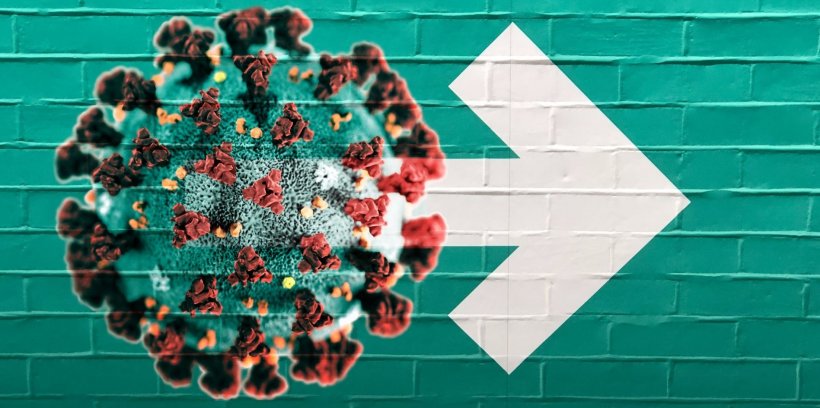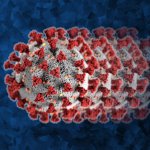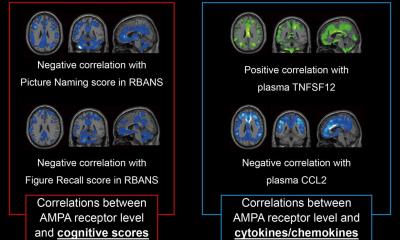
Image sources: Unsplash/Nick Fewings / Centers for Disease Control and Prevention (CDC) / Alissa Eckert, MSMI; Dan Higgins, MAMS; Editing: HiE/Behrends
News • Coronavirus complications
Post-acute Covid: study explores risk of developing long term conditions
One in 7 (14%) adults with coronavirus infection developed at least one new condition that required medical care during the post-acute phase of illness, which is 5% higher than adults with no coronavirus infection in 2020, finds a US study published by The BMJ.
The post-acute phase in this study started 21 days (or 3 weeks) after initial infection. Conditions involved a range of organs and systems, including the heart, kidneys, lungs and liver as well as mental health complications. And although the risk of developing new conditions during the post-acute phase of illness increased with age, pre-existing conditions, and admission to hospital due to Covid-19, the results suggest that younger adults and those with no previous conditions were still at some increased risk.
The number of survivors with potential sequelae after Covid will continue to grow
Daugherty et al.
Small studies suggest that some Covid-19 survivors develop short and long term clinical conditions (sequelae). But few studies have examined the excess risk of new clinical conditions due to coronavirus infection beyond the initial (acute) recovery period. To fill this gap, US researchers set out to evaluate the excess risk of developing new clinical conditions after the acute phase of coronavirus infection. Using health insurance records, they identified 266,586 adults (18-65 years) diagnosed with Covid-19 infection from 1 January to 31 October 2020 and examined whether these individuals were diagnosed with at least one of 50 conditions up to six months after initial infection. Individuals were matched to three comparison groups with no Covid-19 infection from 2020, 2019, and a group diagnosed with other viral lower respiratory infections. Differences between groups, such as age, sex, area of residence and medical history were taken into account.
The results show that 14% of Covid-19 infected adults had at least one new condition that required medical attention after the acute phase of illness. This was 5% higher than in the 2020 comparison group and 1.65% higher than individuals diagnosed as having viral lower respiratory tract illness. Risk for specific conditions in the four months after the acute phase of Covid-19 infection - including chronic respiratory failure, heart rhythm problems, amnesia, diabetes, anxiety, and fatigue - was greater than in all three comparison groups. And while the overall absolute risk was small (an extra 0.02 to 2.26 per 100 people developing specific types of conditions compared with the 2020 comparison group), it persisted up to six months after initial infection. Risk increased with age, pre-existing conditions, and admission to hospital for Covid-19. However, younger adults (50 and under), those with no pre-existing conditions, and those who recovered at home were also at risk for new conditions several months after initial infection.
Recommended article

Article • Post-hospitalisation
New study reveals impact of 'Long Covid'
Recovery duration, co-morbidities, mortality, risk groups: A large UK study reports in detail on 'Long Covid'. We spoke with two of the study's co-investigators about why so many patients are still affected after a coronavirus infection.
The researchers point out that this was an observational study, so despite stringent efforts to ensure the comparability of those who had and had not been infected with SARS-CoV-2, they say “residual sources of bias may remain compared to the true effect of SARS-CoV-2 in causing these sequelae.” However, they warn that as the number of individuals infected with coronavirus worldwide continues to rise, “the number of survivors with potential sequelae after Covid will continue to grow.” These results might improve the diagnosis and management of infected individuals, help providers and other key stakeholders anticipate the scale of future health complications, and improve planning on the use of healthcare resources, they conclude.
It is too early to predict how long clinical sequelae will persist after Covid-19, but these symptoms clearly create a major personal burden for many people, says Elaine Maxwell at the National Institute for Health Research, in a linked editorial. And she points out that risk factors differ for different new diagnoses, hampering attempts to predict who will develop particular symptoms and when. “Healthcare professionals should be alert to the possibility of long Covid in anyone with confirmed or suspected Covid-19. How to treat these longer term consequences is now an urgent research priority,” she concludes.
Source: BMJ
20.05.2021





